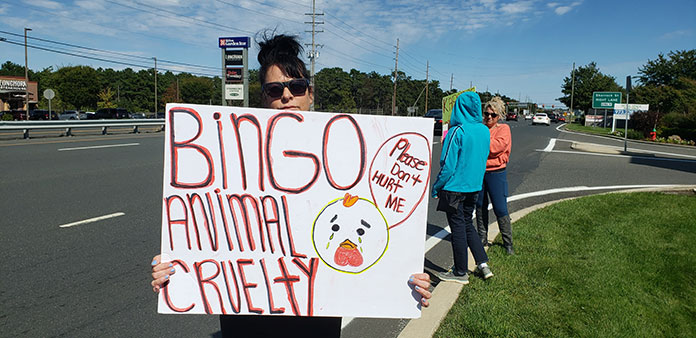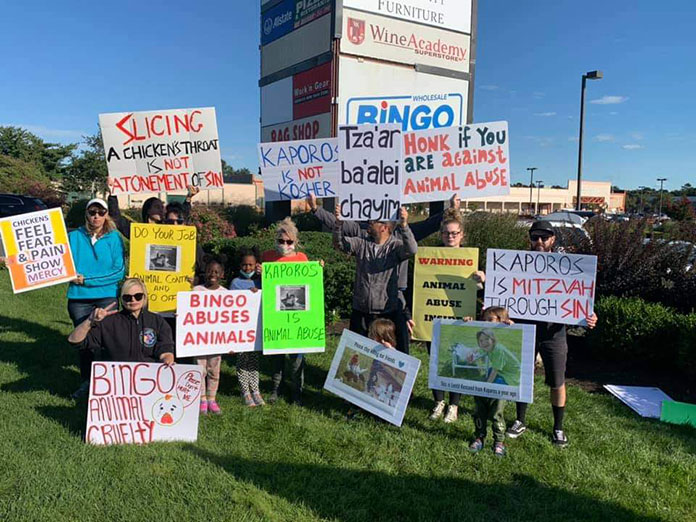
LAKEWOOD – A dozen protestors held up signs and called for the end to using live chickens as part of a religious ritual during a recent rally.
Members of the animal rights group New Jersey Animal Save Movement chose to rally along Town and Country Shopping Center and the highway as it was directly across from a Bingo Wholesale store which was selling hundreds of chickens.
The chickens are killed in relation to the Orthodox Jewish ritual Kaporos during Yom Kippur. Toms River resident Susan Kearney, an event organizer for NJASM, broadcast her message through a bullhorn during the protest. She was joined by fellow members who held up signs declaring strong opposition to the ritual’s use of chickens.
She said trucks filled with chickens bring them behind the store for the ritual. “We called them out (last year) as they didn’t have a health certificate to have the chickens on the premises. They had to give them back.”

Kearney said “people swing the chickens by their necks. I have pictures of all the dead birds that were on the ground. We are here today to call for a stop to this. We have activists from all over the state.”
She referenced an ordinance that was passed in Jackson last year that put some controls in place regarding the treatment of animals. The ordinance could not prohibit the ritual as it is protected under religious freedom. Religious freedom is a federal law and is more powerful than any local one.
In November 2019, the Jackson Council passed the ordinance concerning the ethical and humane treatment of animals during a meeting which was dominated by discussion of the Kaporos ritual and other religious rituals involving animal sacrifices.
During a public hearing held during that meeting, residents had expressed their view that they would have liked to have seen any rituals involving animal cruelty and brutal treatment prohibited.
Jackson’s ordinance allows for the ritual but requires the practice to be conducted within religious institutions and private property.
Jackson Council President Alex Sauickie said at the time, that the ordinance was drafted to prevent abuse of both family member animals at home and those who live in the wild.
Sauickie added “we believe enforcement against these acts of cruelty within surrounding towns was inadequate because they had nothing on the books to deal with them at the municipal level and thus, this ordinance gives our local police officers and code enforcement department the power to enforce these protections and bring those that break them to justice.”
Cruelty is defined in that ordinance as “any act or inaction that causes, is known to cause or is calculated to cause physical or psychological pain, injury, damage or harm to an animal.

“Yom Kippur is a beautiful time so we asked in that spirit if they would surrender some chickens to us. That worked in the past but now, I don’t know,” Kearney said. She noted that none of the chickens are consumed after they are killed.
She added that the ritual allows for the chickens to be replaced by coins “but some say this is tradition and it goes way back but it is not even in the Torah at all. I wish I could understand the need for this. The chickens are crammed into a small boxes and sometimes we find them in bags.”
“We rescue birds,” said Joe who was present with his wife and children. The couple declined to give their last names. “We’re out here today because this is barbaric and there is no reason for it. It is not anywhere in the Torah. Cruelty to animals is forbidden in the Torah. Why are they going against their own book’s word? Even if it was in the Torah it still isn’t right,” Joe said.
Joe added, “we have to evolve with new times and if we don’t need to cause unnecessary suffering we shouldn’t.”
Laura Wolkofsky of Toms River also came out to oppose the practice. “It is wrong and unnecessary. It can be replaced with coins for the ritual. I don’t really think it is being done for a religious reason, thousands of chickens are killed and tortured. They sling them by their wings, they slice their throats and they are not even eating them.”
Wolkofsky said the ritual involves the symbolic removal of sins. “To me its voodoo and it has nothing to do with religion.” She said that transfer trucks carrying at least 300 chickens each were coming out behind the Bingo store.
Rabbi Avi Schnall serves as the NJ Director for Agudath Israel. He said that there were several misconceptions being made about the ritual and explained its purpose and how it was conducted.

“It is not some magic potion where we wave the chicken around for atonement of our sins. I wish it could be that simple. It is more symbolic and a tradition that dates back many hundreds of years to Europe and before that. We take the chicken and say a prayer saying ‘let this chicken be atonement for me’ – so to speak and then the chicken would be slaughtered in a kosher manner and given to charity which is still happening today,” Rabbi Schnall said.
He said despite assertions by the animal rights activists, the chickens were being donated after their death. “The chickens are given away they are obviously brought to a butcher and the butcher cleans them up and takes out the meat and the chicken is given to poor families.”
Rabbi Schnall said that the chicken meat was provided to kosher soup kitchens in the area. “That is the idea – the chicken is given away to charity as in ‘in place of my sins.’ Let the chicken be in place of it as a symbolic type of ritual. Atonement doesn’t happen that fast. You do have to do a bit of self-work.”
“There are a lot of laws that go into kosher/non-kosher. Our chickens need to be killed and the knives that are used are special knives. Many people don’t know this. In order for a person to slaughter the chicken the knife has to be checked and is not allowed to have any nicks in the knife. The blade has to be 1,000 percent smooth and it is tested and if there is any nick in the knife, we don’t use that knife,” the Rabbi added.
He explained further that by using a flawless knife that the slaughter is pain free for the chickens. “It is being done in the most humane and sensitive way. We aren’t just taking a butcher knife and cutting its head off.”
Rabbis are in each Kaporos location overseeing the process and constantly checking the knives throughout the day, he added. He disputed the claim that the ritual was not referenced in the Torah and that coins were being replaced for the chickens in Israel.
“That is far from the truth. It is very much the custom to use chickens in Israel and they are more commonly used there than it is in America. There are many levels of what is called the general Torah and it is definitely in the scriptures and the sources of our religion, this custom of using chickens,” Rabbi Schnall added.
He said that “not everyone follows all the customs. There are many customs in Judaism – even our dress code: some have the long sidelocks, some don’t; some have to grow a beard, some don’t. This is another custom in Orthodox Judaism that many people have. Some do use coins and some use fish. It depends on where you originate from. There is a source in our Torah.” He also noted that included in the Torah was a commandment to treat animals with respect. “It would be quite ironic to use an animal for atonement by transgressing a commandment to treat animals with respect.”
“Especially in Lakewood we take very good care to make sure the chickens are treated well,” he said.

“I don’t expect the animal rights groups to be scholars who would know this and the thing about Israel not using them. I don’t know where they got that from,” he added.
The ritual goes on between Rosh Hashanah and Yom Kippur. “The idea is to get it done before Yom Kippur because that is the day of forgiveness.”
Rabbi Schnall said any permits required regarding the handling of chickens and where the locations for the ritual can be held is done through the community itself.
The rabbi noted thousands of chickens were used in the rituals in Lakewood and during the time of the interview he said he would soon be picking up three or four chickens himself for his family.
“It costs me $70 or $80 and the chickens will go to charity. The tens of thousands of dollars of food will go to charity which is an incredible thing. It goes to charities in different locations, mostly kosher soup kitchens,” Rabbi Schnall added. “There is a tremendous amount of charity being produced by this ritual.”
JerseyShoreOnline.com also attempted several times to speak with a representative of the Bingo Wholesale store in Lakewood but was told that no one was authorized to give a comment and that the manager would reach out if he wished to make a statement for this story. At press time no one responded.
Mordechai Schwartz who operates the Kapporos Center in Lakewood was also contacted for this story, but at press time had not responded.






